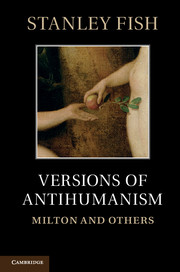Book contents
- Frontmatter
- Contents
- Acknowledgments
- Introduction: intention, historicism and interpretation
- Part I Milton
- Chapter 1 The Brenzel lectures
- Chapter 2 To the pure all things are pure
- Chapter 3 “There is nothing he cannot ask”
- Chapter 4 Why Milton matters; or, against historicism
- Chapter 5 Milton in popular culture
- Chapter 6 How the reviews work
- Chapter 7 The new Milton criticism
- Part II Early modern literature
- Index
- References
Chapter 4 - Why Milton matters; or, against historicism
Published online by Cambridge University Press: 05 May 2012
- Frontmatter
- Contents
- Acknowledgments
- Introduction: intention, historicism and interpretation
- Part I Milton
- Chapter 1 The Brenzel lectures
- Chapter 2 To the pure all things are pure
- Chapter 3 “There is nothing he cannot ask”
- Chapter 4 Why Milton matters; or, against historicism
- Chapter 5 Milton in popular culture
- Chapter 6 How the reviews work
- Chapter 7 The new Milton criticism
- Part II Early modern literature
- Index
- References
Summary
To the question assigned us – why does Milton matter? – I would add two additional questions: Matter to whom? And matter as what? The second – matter as what? – is the crucial one, for I take it to be true that things matter in particular ways – nothing matters in every way – and I also take it to be true that the particular way a thing matters is a function of what it is intended by its maker or author to be. That is to say, when evaluating a human production (as opposed to a natural phenomenon) one must begin with a precise understanding of its purpose. What was it meant to do? What task was it fashioned to perform? Once these questions have been answered, you are equipped with a framework from the perspective of which you can identify the relevant features of a performance. And once those features have been identified, you can go about the business of determining what they mean, all the while keeping in mind that the meanings you seek to establish will be meanings specific to the purpose of the agent or agents who set out to do something, not everything. (Here I reaffirm C.S. Lewis's assertion that, “The first qualification for judging any piece of workmanship from a corkscrew to a cathedral is to know what it is – what it was intended to do and how it is meant to be used.”) It is in relation to the something purposive actors set out to do that the end result must be evaluated. If the evaluation is strongly positive, you say: “That's a really good instance of X or Y or Z – a really good song, or a really good wine, or a really good automobile, or a really good movie.” And if this positive evaluation is transmitted to, and shared by, generations subsequent to the initial appearance of the something someone set out to do, you can then say, “This really matters,” by which you will mean that in the history of the effort to do that kind of thing, this is a shining and lasting and exemplary contribution.
- Type
- Chapter
- Information
- Versions of AntihumanismMilton and Others, pp. 98 - 109Publisher: Cambridge University PressPrint publication year: 2012



